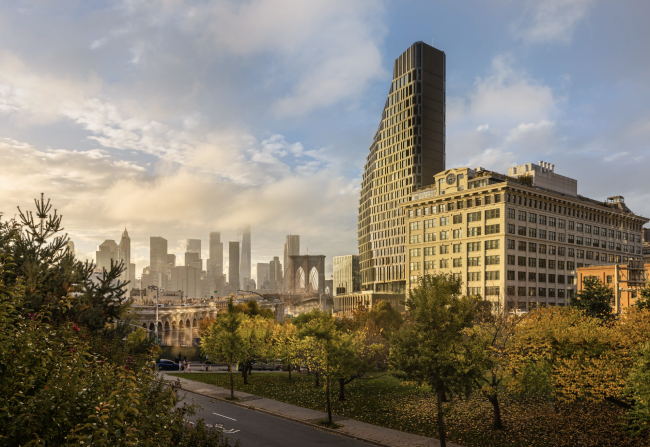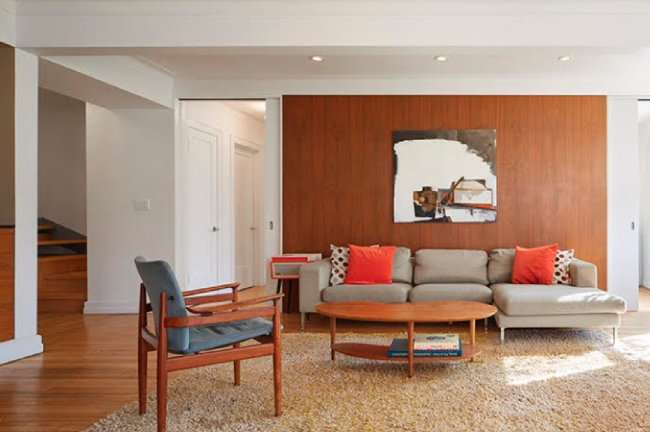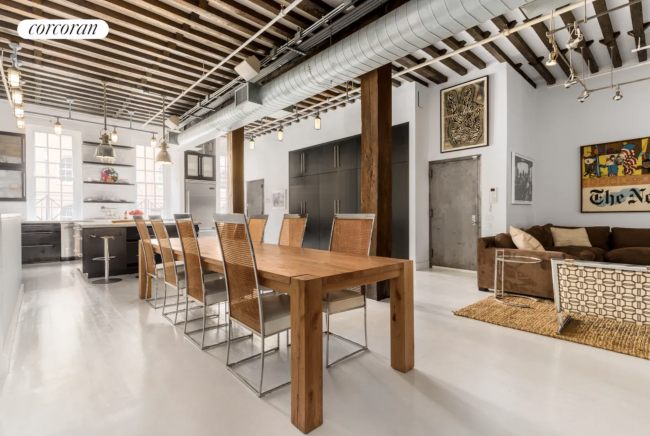The pros and cons of buying a penthouse apartment in NYC
- Privacy, outdoor space, views, and high ceilings are key selling points
- Bad weather, maintenance issues, and building disputes can be drawbacks

Private terraces and panoramic views are two perks of penthouse living you can get at 500 West 22nd St., PHW, a new three-bedroom condo listed for $8.95 million.
Many consider penthouse apartments the ne plus ultra of New York City real estate—with jaw-dropping views commanding equally precipitous top dollars. But given the luxury development boom, which created loads of upscale condos that don’t need a long elevator ride for access—do these apartments still stack up?
The answer appears to be yes because, it turns out, there’s another reason to appreciate penthouses: They come with private outdoor space.
Leonard Steinberg, chief evangelist and corporate broker at Compass, says, "The penthouse of a building has always been synonymous with the ultimate New York dream: Perched above the hustle-and-bustle of the city, penthouses are the ultimate sanctuary, and there are so few of them relatively that they have collector quality."
“Penthouses commonly include outdoor spaces that offer unrivaled use and enjoyment ranging from al fresco dining, cocktails and entertaining, to a private space to take a walk without ever having to leave the apartment—it is a sky-high backyard,” says Barbara Fox, founder of real estate brokerage Fox Residential.
[Editor’s note: An earlier version of this article was published in October 2023. We are presenting it again with updated information for October 2024.]
Fox has first-hand experience—not only does she sell a lot of penthouses, but she lives in one, too. She says privacy, ample outdoor space, and higher ceilings are among the many selling points.
Being on a higher floor, and sitting on top of a building, impacts resale value. That’s a fact of real estate valuation, explains Jonathan Miller, president and CEO of appraisal firm Miller Samuel. “The market has not shifted away from that," he says.
That is, as long as they truly are penthouses. These days, a penthouse isn't always a penthouse. Some new developments launch their projects with multiple penthouses, which Miller considers a marketing ploy to make an apartment more desirable.
Read on for more from these and other experts on the pros and cons of living in a penthouse apartment.
Why you would want a penthouse
That indescribable feeling. Of course, the prestige and sense of arrival comes with being able to live in a penthouse, Steinberg says. "There's always something nice about hitting that PH button in the elevator. You aren’t a number anymore.”
Penthouse perks. Unobstructed views, lots of light, higher ceilings, elevators that open directly into the apartment, and private outdoor space (see below) are common—and often de rigueur—in penthouses. “Other apartments might deliver some of the above, but for the most part, it’s the penthouse that provides these desirable attributes,” Steinberg says.
Peace and privacy. Penthouses are quieter than other apartments for a couple of reasons—they're further from the street noise below and never come with upstairs neighbors. No more toddlers running above your ceiling and disturbing your peace.
Outdoor space (the ultimate upside). For many New Yorkers, having outdoor space is the end-all, be-all, and the main reason for buying a penthouse.
A terrace was certainly a must for Fox (she has several pets) and is something she uses all the time. “I love gardening and to sit and relax in the morning and on beautiful days,” she says.
In some of the super-tall buildings, creating a terrace is more challenging because of wind. There are no terraces for the penthouses on the 96th floor at 432 Park Ave. because they would be unusable, Steinberg says. Buyer beware.
Not that penthouses have a lock on outdoor spaces. “There are other apartments on lower floors with enormous terraces in my own building, which can be equally desirable to clients,” Fox says.
All things being equal, however, a terrace on a middle-floor apartment will not have the same value as a similar-sized terrace on the penthouse level. “There’s less risk of that view becoming obstructed,” Miller says. Only if the mid-level apartment is much larger (say, three combined units or a duplex) or has some other quantifiable asset would it have a higher valuation, he adds.
Panoramic views. Sure, you can have gorgeous views from other apartments, but they often can’t compete with the views from the top floor—and especially when said views come with the added value of your own private outdoor space. “The sunlight is so beautiful on these higher floors too,” Fox says. (She is on the 19th floor.)
To capitalize on her own views, Fox replaced smaller windows with floor-to-ceiling ones throughout the whole apartment—something her board approved because the penthouse is not visible from the street.
Less market volatility. For all the above reasons, on average, penthouses tend to sell for about 5 to 10 percent more than non-penthouse apartments. And they also tend to be less affected by market volatility as a result, Miller says.
Why you might think twice about buying a penthouse
Exposure to the elements. It’s safe to say you're more susceptible to the elements when living right beneath the roof.
According to Jeff Schneider, president of insurance brokerage Gotham Brokerage, storm damage to the roof or ice damming is more likely in a penthouse than in other units.
You will also be liable for any overflow of sinks, tubs, and washing machines. “As there are more floors below you to damage, you might want to have higher limits on your policy," he says. (Note: There are no insurance surcharges for proximity to the roof or elevation.)
The proprietary lease delineates what the building vs. penthouse owner is responsible for, Schneider explains, but generally, the building takes care of the exterior structure, including the roof and common areas, as well as the concrete “box” of the apartment.
The problem is some claims do not fall under insurance, like faulty construction or improper sealing of a roof, he adds. “You can try to recover from the contractor, but that is not always easy.”
Outdoor space (the flip side). Landscaping requires a lot of planning, planting, and upkeep, plain and simple, although you can always hire someone to take care of that—and the watering systems—for you.
Then there are the inevitable yet unpredictable winter conditions. Ordinary maintenance is the responsibility of the person who lives in the penthouse. You can't just shovel two feet of snow off the roof. And what happens when it melts and some of the snow is now ice and blocks the path to the roof?
Smaller interior footprint. Having setbacks that create terraces reduces your interior footprint, which is why you’ll notice a lot of penthouses were originally built as duplexes or have existing greenhouse additions, Fox says.
You may be able to build up or out on your own penthouse, but the fact that you buy a penthouse apartment doesn’t include with it the right to enlarge an apartment or to use up the building’s development rights, which are worth hundreds of dollars per square foot.
It will also require an enormous amount of effort and be an incredibly expensive proposition to get it approved by the board, landmarks, and the DOB, Fox says.
That said, you can create a duplex by combining your top-floor penthouse with an apartment on the floor below, again assuming your board will give you the go-ahead. That certainly happens.
Workers need access to the roof. Buildings must conduct facade or roof work every few years—a requirement of NYC's Facade Inspection & Safety Program (FISP) aka Local Law 11. There may also be water towers (on older buildings) and HVAC systems that will require servicing every so often. These essential services just might involve workers traipsing around on your terrace (or through your home).
When there’s work being done on the roof—or the roof is being used to stage repairs to the facade—and penthouse owners lose access to their outdoor space—as a general rule, they’re not compensated for this loss of access, says Jeff Reich, an attorney at Schwartz Sladkus Reich Greenberg Atlas.
“Given the potential disruption to a penthouse owner that a FISP project could bring, potential purchasers of penthouse apartments should do whatever they can to determine when the last such project was conducted and whether there is any information that can be gleaned from the building board or management as to when the next such project may be undertaken," he says.
Fox acknowledges this potential inconvenience but says she’s “never been too disturbed in my 10-plus years of penthouse living.”
After all, those workers are making the entire building (and your penthouse) all the more safe and sound.
Building disputes. "Whenever you’re buying a penthouse, it is a good idea to confirm the outdoor space that is for the exclusive use of the penthouse occupants. It is not unheard of for there to be a dispute as to what space a penthouse owner actually owns," Reich says.
This is especially true if the board feels as though the penthouse owner is using space that is a common area, or vice versa, he adds.
Case in point: Fox was involved in a dispute (indirectly) where a co-op took possession of part of the terrace of one of the penthouses (her client was in another), turning it into a public area.
How can this happen?
“In a co-op, the terrace is for the private use of the occupant but is owned by the building," Miller says.
One attorney told Brick that he sees more litigation involving penthouses than other apartments. There are the issues of leaks, of course, and who's responsible for them. But there are also plenty of lawsuits that come out of how penthouse owners use their coveted outdoor spaces.
You need to make sure everything you put up there is legal and doesn’t disturb people below. Specifically, when it comes to decorating your outdoor space, the standard limit is 40 pounds per square foot. Co-ops and condos have a right to regulate those things. Message: Heed the rules.
Practical issues. There are more stairs to walk down if the power goes out or you need to evacuate should catastrophe strike, but most new buildings have generators, so at least one elevator should be working, Steinberg says. And these newer developments have extraordinary safety measures built in, he adds.
The final verdict
Some of those interviewed pointed to the softness in the Manhattan sales market—however, while the number of sales may be down, Manhattan prices are not tumbling.
Fox says she cannot think of one downside other than having to tie down the outdoor furniture during a big storm, which her building does for her.
“Even that is not such a downside. Plus, there’s nothing nicer than being able to take a little walk outside in the morning to see what the temperature is,” she adds.




























